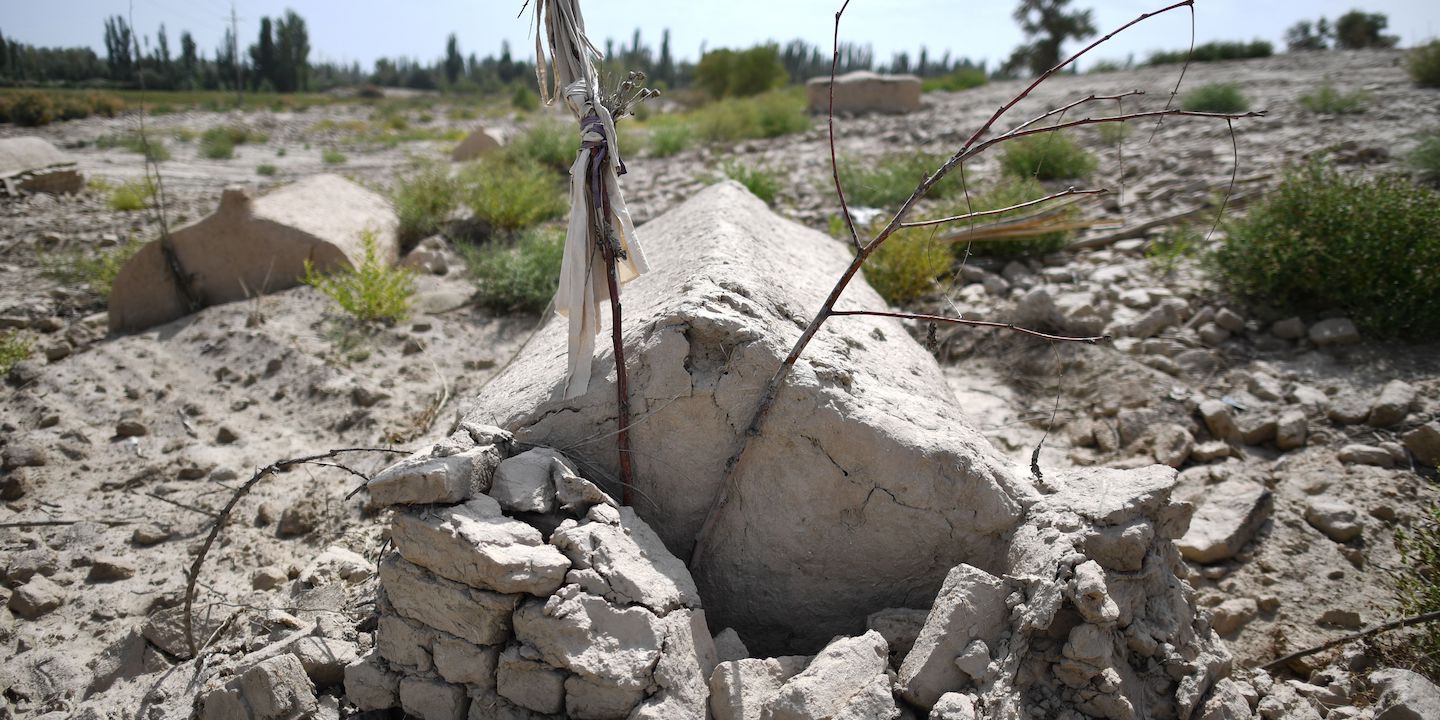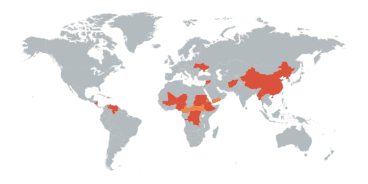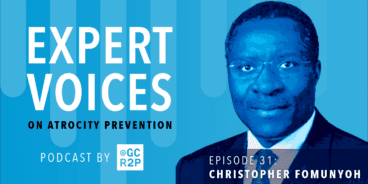

Atrocity Alert No. 222: China, Côte d’Ivoire and Nagorno-Karabakh
Atrocity Alert is a weekly publication by the Global Centre for the Responsibility to Protect highlighting situations where populations are at risk of, or are enduring, mass atrocity crimes.
New evidence of China’s mass detention of Uighurs and destruction of cultural heritage
On 24 September the Australian Strategic Policy Institute (ASPI) issued two major reports, one examining the detention system in China’s Xinjiang Uighur Autonomous Region (XUAR), where an estimated one million Uighurs and other Muslim minorities are detained, and another on the destruction of Uighur cultural heritage. The reports contribute to growing evidence that the Chinese authorities are committing crimes against humanity and genocide against the Uighur population.
Using satellite imagery, official construction documents and other sources, ASPI identified more than 380 suspected detention facilities in XUAR, including so-called “re-education” camps, detention centers and prisons that have been built or expanded since 2017. The overall number of such facilities appears to be significantly higher than previous estimates. These findings also contradict the Chinese government’s claims that all Uighur “trainees” from its so-called vocational training centers had “graduated” by late 2019. Instead, it appears that many detainees were simply charged and transferred to more secure facilities or sent to factories for coerced labor assignments.
Chinese government authorities have also systematically desecrated Muslim shrines, cemeteries and pilgrimage sites that represent an essential part of Uighur culture. ASPI found that approximately 16,000 mosques – 65 percent of the total mosques in XUAR – have been destroyed or damaged as a result of government policies. Additionally, two Uighur cultural practices listed in the UN Educational, Scientific and Cultural Organization Intangible Cultural Heritage register – the 12 muqam and the mäshräp – have been severely impacted. According to ASPI, these attacks on cultural heritage “appear to be a centrally driven yet locally implemented policy, the ultimate aim of which is the ‘Sinicization’ of indigenous cultures, and ultimately, the complete ‘transformation’ of the Uyghur community’s thoughts and behavior.”
Nadira Kourt, Program Manager at the Global Centre for the Responsibility to Protect, emphasized that, “since culture is an intrinsic part of group identity, intentionally destroying Uighur cultural heritage can be seen as an attack on this group and their very existence. What is underway in Xinjiang is nothing less than a slow-motion genocide.”
Under customary international law and the Rome Statute of the International Criminal Court, the widespread and systematic persecution and mass detention of Uighurs could constitute crimes against humanity. The Chinese government also appears to be perpetrating acts prohibited under Article II of the Genocide Convention, of which China is a signatory. The UN Human Rights Council should establish an impartial and independent mechanism to report on the human rights situation in XUAR.
Heightened tensions ahead of election in Côte d’Ivoire
One month before Côte d’Ivoire’s presidential election, scheduled for 31 October, tensions continue to escalate with incidents of ethnic violence and an increase in hate speech on social media. Michelle Bachelet, UN High Commissioner for Human Rights, noted that the electoral process “has begun amid a tense political context and a backdrop of pre-existing triggers of violence related to issues of nationality, toxic regional and ethnic divides, economic inequalities, discrimination and impunity for past crimes.”
The political situation rapidly deteriorated since August when President Alassane Ouattara announced his decision to run for a third term after his preferred successor, Prime Minister Amadou Gon Coulibaly, unexpectedly died. The Constitution limits the number of presidential terms to two, but the nation’s top court determined that the 2016 revision of the constitution means that Ouattara’s two previous terms do not count, allowing him to run again. At least 15 people were killed in August during political protests. According to Amnesty International, police allegedly collaborated with groups of men armed with machetes who attacked some protesters.
Recent protest violence has revived memories of the November 2010 presidential elections, which resulted in security forces and rival militias loyal to either then President Laurent Gbagbo or president-elect Ouattara, targeting perceived ethnic and political enemies. The violence killed an estimated 3,000 people and resulted in a UN Security Council-mandated military response in order to end atrocities and protect civilians. Although the country subsequently underwent a transition of power and a formal reconciliation process, the underlying ethnic and political grievances that led to past atrocities remain.
Earlier this month the Constitutional Council rejected 40 potential candidates for the presidency, leaving only President Ouattara, former President Henri Konan Bédié, Pascal Affi N’Guessan and Kouadio Konan Bertin to run in the election. During his 1993-1999 presidency Bédié embraced the concept of Ivoirité – a xenophobic ideology used to discriminate against Ivorians with Burkinabe and Malian origins. Meanwhile, other influential political figures have been blocked from running, such as Gbagbo, who remains in Belgium after his acquittal by the International Criminal Court, and Guillaume Soro, a former rebel leader and prime minister.
Ivorian religious and traditional leaders, as well as the UN Special Representative for West Africa and the Sahel, have called for peace and unity ahead of the elections. All political actors must reject the use of hate speech and commit to a peaceful electoral process. The authorities must ensure that the human rights of all Ivorians – including the right to peaceful assembly – are equally protected and respected during the electoral period.
Renewed fighting endangers civilians in Nagorno-Karabakh
On Sunday, 27 September, clashes broke out between the armies of Azerbaijan and Armenia, as well as troops from the local authorities in Nagorno-Karabakh. Azerbaijan’s offensive is aimed at recapturing the breakaway region of Nagorno-Karabakh and has reportedly targeted civilian areas, including shelling the city of Stepanakert. According to news reports, an estimated 100 people have already been killed in the fighting, including some civilians. Turkey has been accused of providing direct military support to Azerbaijan, while Russia, a traditional ally of Armenia, has called for a ceasefire.
On Tuesday, 29 September, the UN Security Council held an emergency meeting on the situation. Earlier that day the UN High Commissioner for Human Rights, Michelle Bachelet, called upon all sides to “respect international human rights law and international humanitarian law, in particular by ensuring the protection of the civilian population and people placed hors de combat, and by preventing damage to essential civilian infrastructure.”
The Nagorno-Karabakh region is internationally recognized as part of Azerbaijan but contains a majority ethnic Armenian population that has been led by their own government since December 1991. The new hostilities are the latest in a long history of clashes between Armenia and Azerbaijan, including a war that resulted in an estimated 30,000 people killed and 1 million displaced. Despite a 1994 ceasefire agreement, sporadic clashes have broken out along the border of Nagorno-Karabakh over the past 25 years. Fighting most recently took place during July this year, resulting in civilian casualties.
Any further military escalation could have potentially devastating consequences for civilians in Nagorno-Karabakh. The international community, particularly the Minsk Group Co-Chairs, must encourage all sides to call an immediate ceasefire and negotiate a permanent solution to the conflict.
Related Content


R2P Monitor, Issue 69, 1 June 2024
